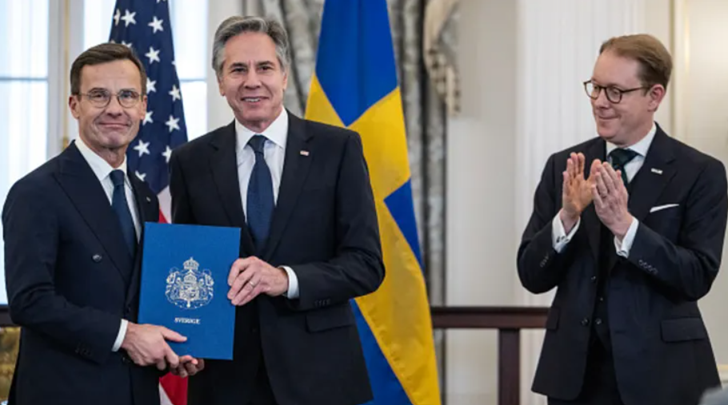Sweden, known for its neutrality for over 200 years, has decided to shake things up a bit by officially joining NATO, becoming the 32nd member of the military alliance. This move comes almost two years after Sweden first applied to join.
The decision was not taken lightly. Earlier on Thursday, the Swedish government held an extraordinary meeting to vote on joining NATO after receiving approval from all current members. The news was then confirmed with a statement from NATO, with Secretary-General Jens Stoltenberg welcoming Sweden to the table.
Stoltenberg praised Sweden’s decision, stating that it makes NATO stronger, Sweden safer, and the whole alliance more secure. He even went as far as to say that he looks forward to raising Sweden’s flag at NATO HQ on Monday. Swedish Prime Minister Ulf Kristersson traveled to Washington, D.C., this week to hand over the final documents, solidifying Sweden’s commitment to the alliance.
This change in stance marks a significant shift in Sweden’s foreign policy, which has long been characterized by military nonalignment. This policy dates back to the Napoleonic wars but has now been reevaluated in light of recent events, particularly Russia’s war on Ukraine.
The decision to join NATO was also influenced by Finland’s decision to join the alliance last April, prompted by Russia’s invasion of Ukraine. Both Helsinki and Stockholm realized that in the face of such aggression, they were no longer safe on their own and applied to join NATO a few months later.
However, Sweden faced some obstacles on its path to NATO membership. Both Hungary and Turkey delayed the process, with Hungary’s Prime Minister Viktor Orban long opposing Sweden’s NATO membership. This opposition was fueled by Sweden’s criticism of the state of democracy in Hungary. Nevertheless, after a meeting in Budapest last month, both countries committed to working through their differences, demonstrating a strong commitment to each other.
Turkey, on the other hand, had concerns about Sweden’s tolerance of groups that it views as security threats. Anti-Muslim protests in Sweden last year further strained relations between the two countries. Despite these challenges, Turkey ratified Sweden’s NATO membership in January, paving the way for Sweden to officially join the alliance.
In joining NATO, Sweden is not just aligning itself with a military alliance but also signaling a shift in its foreign policy. As Sweden takes its place at the NATO table, it sends a clear message that it is ready to defend its security and values alongside its NATO allies.
(Source: Bloomberg | NYT | The Guardian | BBC)









